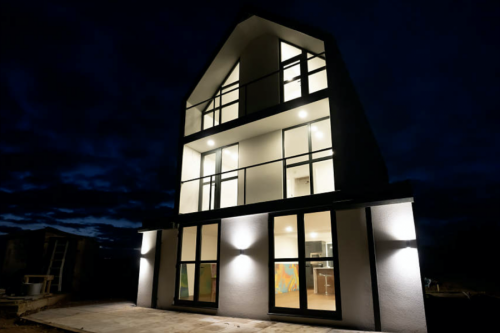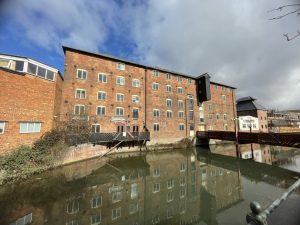Blockchain proptech firm prepares ground for fast growth

A property fintech business is looking to build on solid foundations in 2021 after securing more than £1m from investors.
CurveBlock is a green real estate business that uses blockchain technology to make property investment open to everyone, with a goal of making the public the primary financial beneficiary of the construction sector.

CurveBlock’s concept house
It is working towards the delivery of their platform, technology and compliance filings for various global regulators. It is currently funding housing developments traditionally to ensure the growth and success of CurveBlock isn’t reliant on how quickly market adoption takes place. Once built, CurveBlock platform users will receive a dividend every time there is a liquidity event, for example when a house is sold.
It is progressing with projects in south London and Kent and has plans for a major housing development in Sittingbourne.
“We’ve picked a fight with the world’s biggest asset class,” said CurveBlock’s co-founder Gary Woodhead.
“Anyone can own part of the future revenues in an evergreen sense for as little as £10, whereas historically that market has been controlled by the wealthy, the institutions, the banks.
“Using our business model with the technology opens up the market to everyone and enables them to partake in real estate that has huge, huge potential uplifts in return on capital employed.”
CurveBlock uses blockchain to underpin its business model, but with several key differences to avoid some of the issues that cryptocurrency and other blockchain-based businesses can face.
Woodhead said: “There are three ways we see blockchain businesses have created an achilles heel for themselves.
“Firstly, they’re decentralised, which creates a huge issue with anti money laundering. Secondly, they peg themselves to Bitcoin, which is highly volatile and means there is no stability for the business.
“Thirdly, they aren’t embracing jurisdictional compliance, whether that be the FCA in the UK, the SEC in America, or other regulatory bodies around the world.
“I believe these issues will mean they never get mass market adoption.”
CurveBlock’s founders have deliberately taken a different approach, by not pegging to Bitcoin and by embracing regulation. They believe this will enable them to grow at pace by giving confidence to investors who are wary of the decentralised and unregulated world of cryptocurrency trading.
“The technology allows us to digitise, and then fractionalise, all the future revenues of construction,” said Woodhead. “This is in contrast to the existing stock market where the large wire houses are the ones profiting from fractionalisation of shares which are already digital and have been for more than 20 years.”
CurveBlock is an early-stage business with big ambitions – “I don’t like to say the word unicorn because I think it’s a bit oversaturated in the startup world,” said Woodhead, although its roadmap is for an IPO inside six years – and it plans to get there by not only tapping into a broad investor base, but also the real estate sector’s demand for green housing.
It is focused on delivering net zero, energy positive homes, which don’t use gas and produce more electricity than they consume.

CurveBlock co-founder Gary Woodhead
Woodhead believes this creates a route to scale quickly, working with local authorities and venture partners to deliver housing at volume while avoiding some of the planning constraints that hinder or halt developments.
He is also optimistic that it can be used to make it easier for mortgage lenders to approve applicants who don’t have a large deposit, by taking first charge on the surplus energy produced by their houses.
The timing may well be right for CurveBlock, with “build back better” mindsets converging with investors’ interest in and acceptance of blockchain platforms.
“When I originally showed this business idea, people looked at me like I had 10 heads. Nobody was really talking about this technology,” he said.
“Now, we’ve seen adoption occur globally and in August the first digital securities exchange was approved by the FCA.
“CurveBlock is here to stay, it will move from traction to critical mass and displace. I don’t like to use the word ‘disrupt’, I’d say displace many sectors – but for the good of the people and the planet.”
To find out more about CurveBlock and how it is looking to transform the property sector and push the boundaries in the construction of energy positive homes visit curveblock.io.









